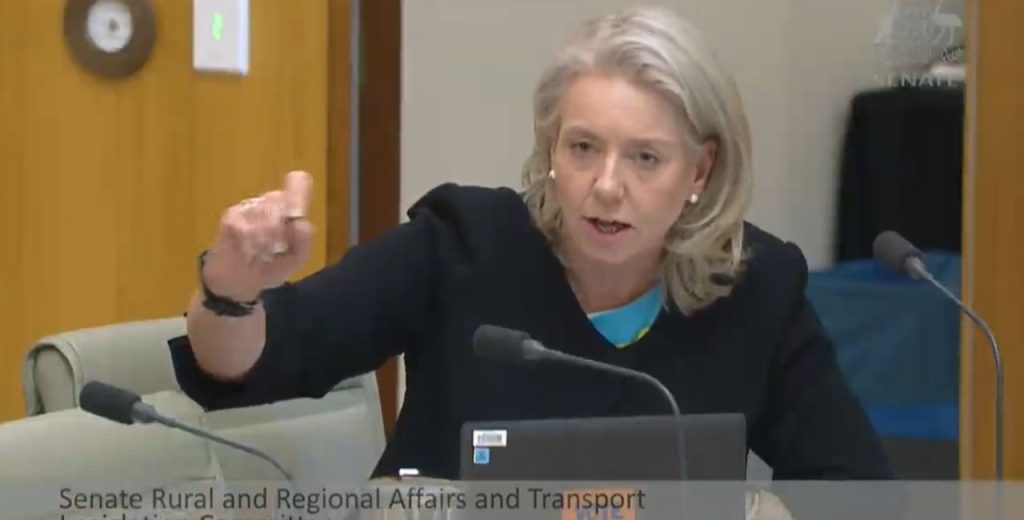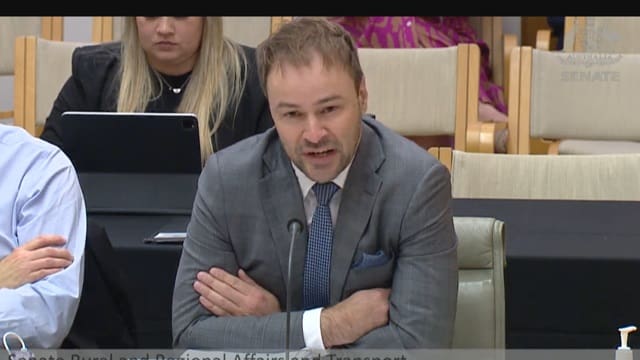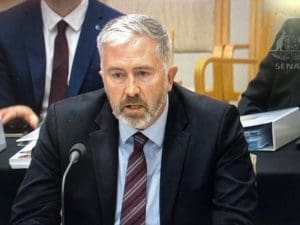
Nationals Senator Bridget McKenzie at Senate Estimates: hopes Keep the Sheep is doorknocking every WA Labor seat to oust the Albanese Government.
WESTERN Australian sheep producers will not receive any support from the Albanese Government’s transition package before July 2025, a Senate Estimates was told yesterday.
The Budget Supplementary Estimates hearing of the Rural and Regional Affairs and Transport Legislation Committee was also told the Department of Agriculture, Fisheries and Forestry did not bother to determine, nor did it know, how many farmers would be affected by the decision to phase out live sheep exports by sea by May 2028.
The hearing heard that the first monies to be disbursed in the government’s $139.7 million transition plan — $900,000 – has been spent on departmental administrative costs, with no expenditure on transition grants.

DAFF first assistant secretary and live export regulator Andrew McDonald at Senate Estimates yesterday.
DAFF first assistant secretary and live export regulator Andrew McDonald reiterated the government had been clear that the transition package is not designed to compensate producers nor fund their exit from the industry.
Nationals Senator Matt Canavan started the live sheep export questions at yesterday’s hearing by asking for the transition package’s funding profile and how many farmers are involved in the live sheep trade.
Mr McDonald said there were 3700 broadacre farms in Western Australia that had a flock of more than 100 sheep in 2022/23.
“I don’t think we’ve got stats on how many actually supplied the livex trade, but around 10-12 percent of sheep from WA farms end up in the livex trade senator.”
When Senator Canavan expressed surprise that the department did not know how many producers supplied the live sheep export trade, Mr McDonald said the producers not only sold sheep for live export; they also supplied saleyards and produced wool.
“We don‘t collect, as the regulator, how many producers are actually supplying into the export market, but we do know between 10-12pc of sheep sold off farms end up in the livex trade at the current time.”
Senator Canavan said he was shocked and asked how the transition plan was designed “when you don’t know how many people are affected?
Mr McDonald said the transition plan and the assistance package were decisions of the government based on the recommendations of the independent phaseout panel.
“The assistance measure were designed to be consistent with the recommendations of the independent panel and when we were doing costings they were agreed in the usual way through the Department of Finance an various assumptions would have been made around the total aggregate of sheep enterprises in WA and enterprises in the supply chain, and assumption around eligibility,” Mr McDonald said.
“It’s not around how many were exposed to the trade, it would have been assumptions around uptake and those are matters done through Cabinet and budget processes, which we don’t typically release, senator.”
Mr McDonald acknowledged that an Episode 3 report commissioned by the independent panel did have “a number” of WA producers supplying the trade in 2019 – a time of different demographics and numbers — but he did not know it and would have to take the question on notice. Click here to see the Episode 3 report and see pages 166-168 detailing data on the numbers of live sheep vendors by Local Government Area.
Mr McDonald said DAFF and ABARES relied on the Australian Bureau of Statistics for its sheep producer numbers and in the financial year 2022/23 there were 3700 broadacre farmers in WA that had a flock of more than 100 sheep, and within that 1700 reported as specialist sheep producers, meaning there were 2000 mixed enterprises of sheep, beef and grain.
Mr McDonald said he did not have an estimate of how many of the 1700 specialist producers derived an income from the live sheep trade.
ABARES executive director Jared Greenville said the bureau did not ask in its surveys, nor have a direct estimate, how many producers would be selling into the live export trade or other markets. But he said it could be assumed that the specialist producers would be the key group affected by changes in the market.
“I mean that might have made some sense I suppose back in the day when everything was hunky dory,” Senator Canavan said.
“But it seems a little strange now given that the government has had a plan to shut down the live sheep trade for 2.5 years that no one has bothered asking the question – how many farmers are actually exposed to this policy?
“Can I just be clear that the department the government has not bothered to ask – they talk to them every year, you provide a survey every year – but you haven’t bothered to ask do you derive income from live sheep and if so how much?”
What is ‘on-ground’ assistance?
Mr McDonald said the $32.7 million recently added to the initial $107m transition package would go toward “on-ground” assistance for sheep producers and supply chain participants to diversify and not necessarily into agriculture.
“It’s supplementing what is already there,” McDonald said.
He said there are no specific exit assistance grants.
McDonald said the initial $64.6m in the transition package for sheep producers, supply chain and processing sector has been increased to $97.3m. This included $45.4m to farmers and supply chain participants as part of co-design process. He said $43.5m would be administered through a federated funding agreement with WA Government – providing a $40 million processor grants stream, $1.5m for a community wellbeing program and $2m in administrations costs for the WA Government, $2.4m for additional services for WA Rural Counselling Service and $5.9m in departmental costs incl. fees to community grants hub.
Nationals Senator Bridget McKenzie asked how the sheep producer assistance could be defined as ‘on-ground’ if there were no exit grants.
Mr McDonald his use of the phrase ‘on-ground’ meant it was going to participants in the industry.
“It’s a turn of phrase.”
No WA sheep producer funding till July 2025

Assistant Minister for Agriculture, Fisheries and Forestry Anthony Chisholm at Senate Estimates this week.
Mr McDonald said producers will be able to directly access the transition money through a series of programs through a ‘co-design’ process with industry “over the next little while.”
He said Minister for Agriculture, Fisheries and Forestry Julie Collins has announced that through a co-design process DAFF will identify suitable programs and establish guidelines that will enable the supply chain to make applications.
“That funding which I announced earlier was a total of $45.5m, our anticipation is that will commence next financial year senator,” Mr McDonald said.
“So from July 2025; so this is an election commitment made more than 2.5 years ago … it has taken 2.5 years to actually implement, you’ve brought forward the date from the original plan and no-one is actually going to see any support from this government until after the next election,” Senator McKenzie said.
“You would think Minister, you’d think, if you were going to shut down the live sheep trade and cruel not only the farmers in WA, the regional communities and indeed our trading partners … but in none of the design of shutting it down did you think about getting support front-loaded for these communities, these farmers, until after the next election and next financial year.
“How is this good enough minister?” she asked assistant Minister for Agriculture, Fisheries and Forestry Anthony Chisholm.
Mr Chisholm said: “Well obviously the phaseout doesn’t begin till May 2028…
“We also had the work that the independent panel did, in terms of their work, we also had to get the legislation through parliament which was only very recently and then the government and then the department has talked through the co-design process which I think is a good step for the government to take, in terms of making sure that we get these settings right before the policy is put into place.
“So I think that we are taking a proactive approach.”
However, Senator McKenzie said Mr Chisholm would know that farmers would not “suddenly wake up” and change their practices in 2028.
“They are shedding sheep right now in anticipation.
“The economic impact is being felt now,” she said.
“That’s why the government has the support package in place,” Mr Chisholm said.
“We’re going through the co-design process to ensure that we get the policy settings right so that we can work constructively with those in the industry and those who support the industry at the same time.”
Senator McKenzie said it is now glaringly obvious why the Keep the Sheep campaign is so necessary in Western Australia to stop what the Albanese Government’s live sheep trade policy is doing to the WA community.
“I just hope they are doorknocking every Labor seat in Western Australia to kick your government out and stop this happening.”
Trade phaseout debacle – WAFarmers
WAFarmers president John Hassell told Sheep Central after the hearing that the failure of the government to assess how many producers the trade phaseout would impact and that it would not give any assistance until after July 2025, “showed how much of a debacle it is, when there has already been such a devastating impact on the industry and regional communities.”
“It really demonstrates that they didn’t do their homework; it was really just a confirmation that the whole thing was based on activism rather than on any kind of science, because they’ve done no measurements whatsoever.”
Labor treating farmers with contempt – Littleproud
Nationals leader David Littleproud said Labor has turned its back on the farming industry and has treated our live sheep farmers with nothing but contempt.
“Labor’s transition package for farmers won’t see the light of day until the next financial year and well after the next federal election.
“This funding will come years after Labor initially announced it will end the trade,” he said.
“It is another delay in support for our farmers, who are having their livelihoods taken away.
“The Nationals fully support our live sheep export farmers and as our first action will reinstate the trade,” Mr Littleproud said.
“We know our farmers want to keep their industry, not lose it with an insulting and delayed transition package.”

This federal government destroyed a vibrant sheep industry at least 18 months ago with their banning announcements, and not just in WA. They have learnt nothing from the destruction they caused in banning the live cattle trade overnight. And can you tell me how much of that compensation has now been paid by this government and how many years after that event? This government has no conscience and will happily hurt our farmers to gain Green votes. There is no accountability for their actions.